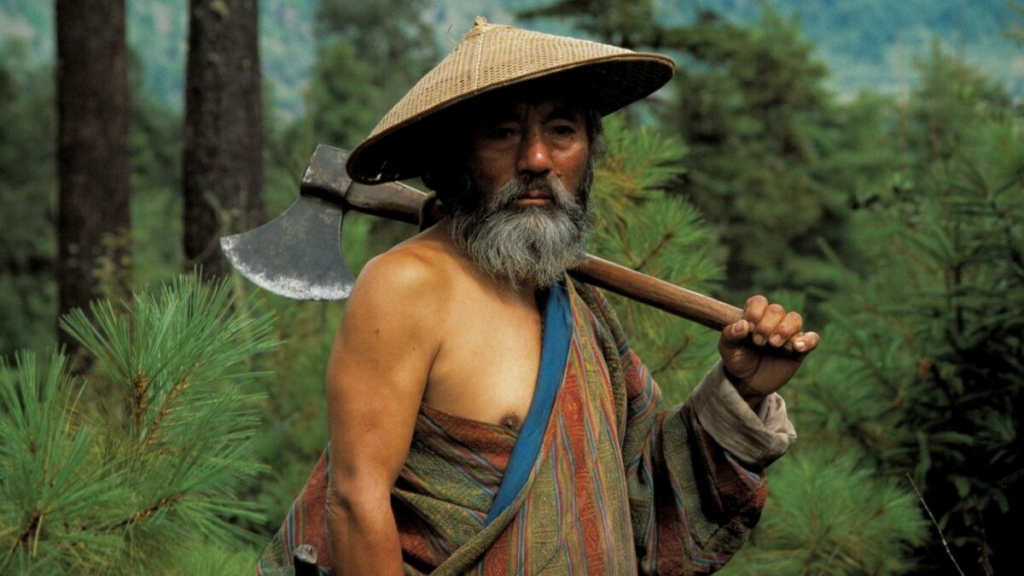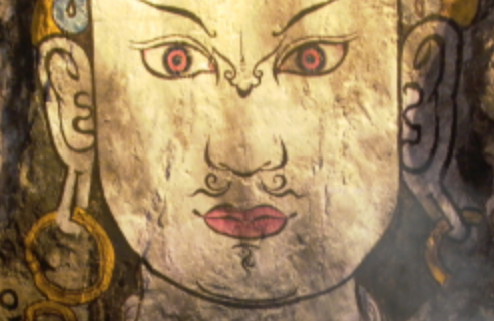Title: Travelers and Magicians
Director: Khyentse Norbu
Released: 2004
Country: Bhutan
Language: Dzonghka
English Subtitles: Y
Closed Captioning: Y
Streaming/Available on: Apple TV
A story where the journey is far more important than the destination, Travelers and Magicians (Bhutan, Khyentse Norbu, 2003) questions whether the grass really is greener on the other side of the fence through a scenic and thought-provoking road film. As the narrative progresses, it both warns of the dangers of a dreamland while also demonstrating the aspects of Bhutan that make the country so unique.
The film opens with Dondup (Tshewang Dendup), a government official in a small Bhutanese village. His dissatisfaction with his life in Bhutan has driven him to travel to America, and he restlessly awaits a letter that will contain his accommodations to leave. After receiving it he leaves his village, impatiently quitting his job for what he believes will be a better opportunity in a new country. Along the way he is stopped and presented with a going away gift, and in the next shot throws it off a bridge – symbolizing his desire to completely rid himself of his old life. Delayed, he misses the bus and resigns himself to hitchhiking. When waiting for someone to pick him up, he is joined by an apple seller and a monk. The monk (Sonam Kinga) is told of Dondup’s desire to go “the land of [his] dreams” in America, and in hearing this quickly warns him of dreamlands. The monk then begins a story that lasts throughout the movie about Tashi (Lhakpa Dorji), a young man who hallucinates a magical land where he encounters an old man (Gomchen Penjore) and his much younger wife Deki (Deki Yangzom). This parallel story continues on throughout the movie, even as Dondup begins to meet more people through his travels, including a beautiful 19-year-old girl, Sonam (Sonam Lhamo).
The embedded narrative Norbu employs throughout the film skillfully ties together the two plots in an inventive and engaging way. Some of the shots between the two narratives correspond; the film focuses on the old man’s eyes right before it transitions to the eyes of a picture in a cave where Dondrop and his acquaintances are staying.

Figure 1: The old man in the monk’s story

Figure 2: The art on the wall of the cave
Like the parallel shots, the stories also show many similarities. Both narratives tell of a journey that has a strong impact on the main subject, and the clever transitions that reflect the parallels between the two stories make the overall plot far more compelling and captivating.
While the dual narrative helps capture and hold the viewer’s attention, the film also comes with a strong message of appreciating what you have and taking caution with the idea of a dreamland – particularly one you’ve never been to. In the shot where Dondrop is first introduced, everything from his T-shirt to his music points to his obsession with America. In the story the monk tells, Tashi also finds himself dissatisfied with his current life and desiring something more than the situation he finds himself in. Both characters must grapple with the question of whether or not life is truly better in their dreamland, or if this dreamland even exists outside of their own head. The film explores this question in a way that leaves the viewer pondering the same poignant questions as the characters from both stories.
Bhutan has stood out internationally because of its relatively untouched beauty and traditional values, both of which are reflected in the film. Long shots of natural Bhutanese landscapes are interposed throughout; the viewer is able to enjoy the enticing scenery. Travelers and Magicians was shot entirely in Bhutan, and is highly unique in that regard, so the audience gets a window into authentic and striking views of the country. Along with the scenery, both of the women in the film reflect on the traditional values of Bhutan, allowing a more complete study into not only what the country looks like, but also what values they hold in high regard. The young girl travels with her father, taking care of him. Deki is hidden away from the world and only interacts with her husband before connecting with Tashi. The young girl displays the values Bhutanese people consider important – such as a sense of community and care for those in your family. Deki represents the isolationism Bhutan has encouraged for many years. Norbu is also able to use the monk in the story to showcase his unique knowledge and perspective as a Buddhist monk. From the characters to the scenery, the film acquaints the viewer with Bhutan in an innovative way.
Travelers and Magicians is an intriguing and enchanting movie that combines a captivating embedded narrative technique with picturesque shots that not only inspires a moral lesson in the audience but also instructs about Bhutan. Viewers are left with deep unanswered questions that inspire reflection, and newfound knowledge about the distinctive and isolated country of Bhutan.
